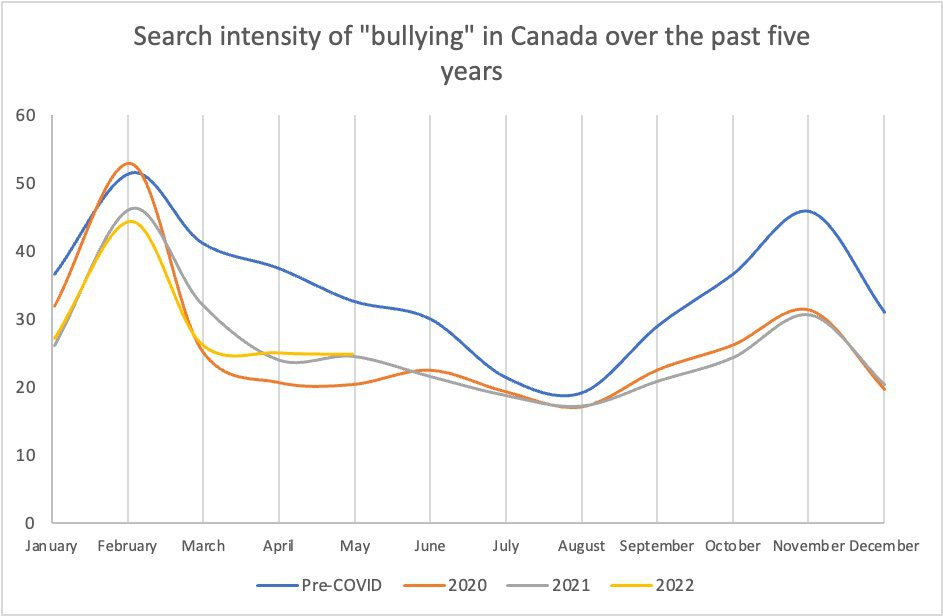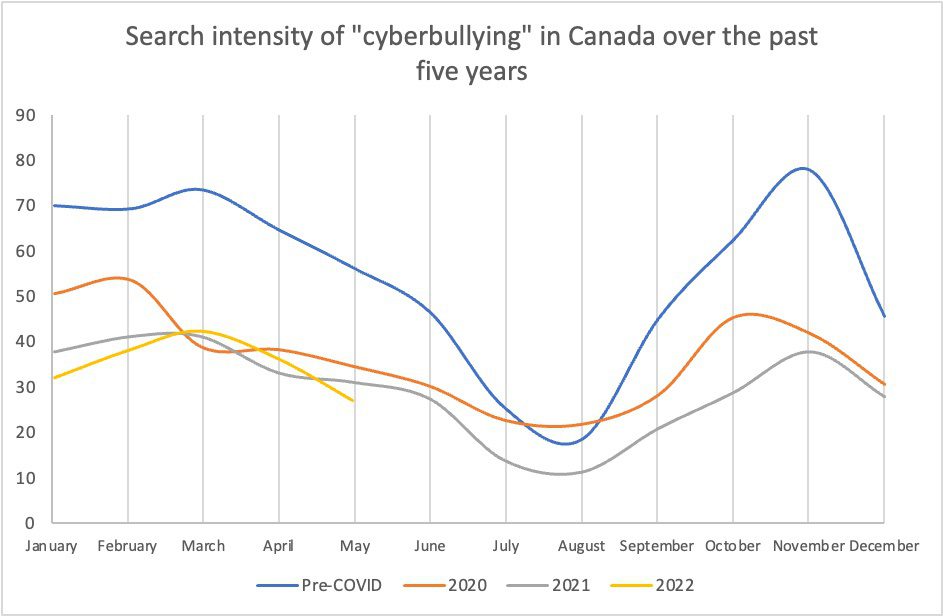[ad_1]
The COVID-19 pandemic could have shut down schools but, as new exploration shows, it also shut down both in-human being and on line bullying. And bullies are continue to lying very low.
Bullying in Canada through the 2020-2021 and 2021-2022 university a long time was down by 28 for every cent from its pre-COVID stage and cyberbullying down by 44 for each cent, primarily based on Google queries for “bullying,” “cyberbullying” and very similar conditions.
“Schools were owning to shift from in-person to distant instruction (in the spring of 2020),” suggests direct researcher Andrew Bacher-Hicks, an assistant professor of instruction at Boston University. “A ton of individuals were being anxious that cyberbullying was going to get off.”
Following all, learners would be reachable on their electronic products all day. Bullies may possibly be equipped to mail messages to their victims as a result of finding out platforms without the need of teachers’ noticing – and victims would have no reprieve.
In fact, online bullying declined, in accordance to Bacher-Hicks and his colleagues.
The scientists utilized Google Developments to measure the recognition of phrases related to “bullying” and “cyberbullying.” This approach has been applied just before to predict voting patterns, stock costs and a assortment of community well being results from flu outbreaks to suicide rates.
Google Traits has the edge of measuring this in real-time. Researchers could see how typically bullying was searched for as it was getting searched for asking college students in a survey would necessarily mean a time delay that could participate in methods on their memories. Google Developments is also all-seeing: college students can lie in a survey, but they simply cannot lie to a look for motor.
Bacher-Hicks and his colleagues identified that there was a about 30 per cent fall in the prevalence of searches for phrases relevant to “bullying” and “cyberbullying” in the United States following the start off of the pandemic.

Implementing their methodology to Canadian information, queries for “bullying” fell by about 40 per cent in the a few months after lockdown and on the internet finding out started – that is, until finally summer time holidays – in contrast to the very same interval pre-COVID.
Queries for “cyberbullying” were currently down by about 25 for every cent in the 1st pair of months of 2020, once again compared to the exact same months pre-COVID. After the pandemic begun, they also fell by more than 40 for each cent.
And even although schools began returning to in-man or woman understanding (with commences and stops) in September 2020, searches for “bullying” and “cyberbullying” have remained reduced and have not returned to their pre-pandemic levels.
(The peaks in lookups about “bullying” in February and November are due to two anti-bullying initiatives, Pink Shirt Day and Bullying Recognition Week, and not to seasonal spikes in bullying exercise. Search popularity doesn’t correctly match how frequently bullying or cyberbullying occurs.)
The drops shocked Bacher-Hicks, whose research focuses on measuring teacher effect and on the inbound links amongst criminal offense and schooling. But it did not shock many of the bullying specialists to whom he arrived at out.
“The exact same folks – both equally in conditions of the victims and the aggressors – are concerned in in-individual bullying and cyberbullying,” states Bacher-Hicks. “Others have famous that in lots of situations … on the internet bullying is an extension of in-human being bullying that’s happening in the course of the school day.
“If you reduce in-particular person bullying, you might also be in a position to cut down cyberbullying without having accomplishing something particularly about cyberbullying.”
Why hasn’t bullying risen additional due to the fact college students have absent back again to university?
Why hasn’t bullying risen a lot more due to the fact students have absent back again to college?
“Some of the key improvements that have been set in spot (in the autumn of 2020) were points to protect against the distribute of COVID from one student to yet another,” claims Bacher-Hicks. These alterations included social distancing and including extra construction to the college working day, to have significantly less unstructured time in the hallways and throughout lunch, for occasion. Decreasing these interactions also decreased bullying.

This viewpoint is shared by Tracy Vaillancourt, a professor of education and learning at the College of Ottawa. Alongside with her colleagues, Vaillancourt surveyed extra than 6,000 Canadian students among Grades 4 and 12 and identified that they claimed fewer bullying right after the pandemic began. She suggests she thinks that the essential to tackling bullying is improved supervision.
“You can see when issues are likely mistaken with learners when you have a reasonable selection of them to show up at to. But if you have two academics for 300 college students, you are not likely to recognize when issues are likely amuck.
“We just will need far more grown ups checking pupils in the course of non-classroom time.”
This does not necessarily mean that older people will act like Large Brother bolstered adult presence should not final result in social isolation and shrunken friendship circles. “Positive associations will prosper,” claims Vaillancourt. “I really don’t believe there is nearly anything that supervision will do to thwart that – but supervision does thwart bullying.”
The Durham District School Board, east of downtown Toronto, has a plan of building grownups visible all around the university.
“The far more beneficial a (faculty) local weather is, the superior (the) prospect of much less bullying happening,” says Gary Crossdale,” superintendent of its Optimistic College Climates division since 2020. It starts with the principal, who sets the tone in his or her interactions with other workers users – not just lecturers but also secretaries and caretakers, for illustration – who then transmit this down by way of their personal interactions with pupils.
When college was in-person (and now that university has returned to currently being in-man or woman), principals and other grownups can be found outside at recess or greeting college students at the doorway when it was online, they would pop into digital school rooms. All of this establishes trust and significant relationships, and it tends to make learners extra comfy reporting circumstances of bullying, Crossdale claims.
“School is just one of the greatest stabilizing options in a child’s everyday living, and grown ups make the finest colleges risk-free and inclusive.”
[ad_2]
Source backlink






